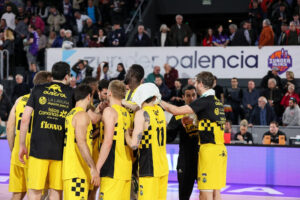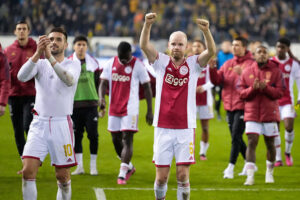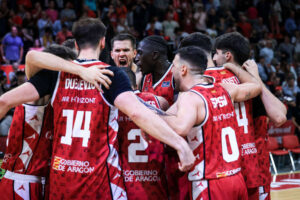The first restrictions due to the pandemic derailed the 2020 calendar. Then, the absence of spectators in the stands reduced the levels of participation of fans in the races, while the lack of ticket sales affected Formula 1 revenues and fares. organization of races practically disappeared.
But although the races have continued and the F1 aspires to contest 23 Grand Prix this year, the owners Liberty Media and teams will still suffer until income levels return to normal.
Other sports have faced similar challenges, and that has led to new ideas looking for new sources of income, as well as better ways to engage with fans.
One of the concepts that fulfill both wishes has occurred in soccer, where several major clubs use digital “fan tokens” to help generate income and improve the participation of their fans.
Cryptographic tokens (cryptocurrencies or tokens from now on) have been used by some of the best teams in the world such as Barcelona, Paris Saint-Germain, Roma, Milan and Atlético de Madrid, and has helped them raise millions of euros.
And, in addition to the fact that fans can buy and exchange (and earn money from) the tokens through exchanges, that has opened the door to direct participation through votes that are taken into account in some decisions of the club.
Barcelona, for example, voted on the choice of motivational artwork to be worn in the Camp Nou dressing room, while Juventus allowed their fans to choose the song to be played to celebrate each time the team will score a goal.
Other clubs have given rewards to fans who have cryptocurrencies, such as being able to participate in video conferences with part of the team’s staff or having cardboard photos of themselves put up in stadiums that spectators cannot yet enter.
The football clubs involved have generated a total revenue of 25 million euros so far, and the fans have enjoyed greater recognition. With this, it was inevitable that other sports would follow suit, and the Formula 1 will be next.
Socios.com at the Allianz Stadium
Photo by: Uncredited
The creation of the concept of fan tokens is the work of Alex Dreyfus, the CEO of the Socios.com platform, where fans can buy cryptocurrencies and vote on club decisions.
“We started with soccer teams, and then we started exploring esports, cricket and the UFC, and now we are heading to Formula 1,” he reveals to Motorsport.com.
Dreyfus hopes to confirm a deal with at least one F1 team in the first few months of this year, and that could open the door for others to follow.
Not only will the token launch increase the revenue stream for the F1 team specifically, it should also act as a springboard for innovation and fan engagement to grow in the future.
While it is unlikely that fans will have the ability to choose a driver for a team, why not let them have their say on the car’s livery or which helmets to choose for certain races?
“If the team wants to innovate, every week they will do surveys and polls, they will have VIP experiences. I see a lot of new opportunities, ”says Dreyfus. “I am very confident that it can be quite successful.”
The confidence that the concept would also work in F1 is due to Socios.com asking the current owners of tokens in its application if they would be interested in supporting a project of any F1 team. The answer was a resounding yes.
Dreyfus adds: “In the ‘locker room’ of our App, which is a crazy idea to blindly promise money to a team even if we don’t know what team it is, reach the two and a half million dollars committed. That helped us a lot to understand the concept. “
But how do fan tokens (cryptocurrencies) work in sports?
The business model for tokens (or cryptocurrencies) is quite simple. The teams get a percentage commission from each token sold, plus a portion of the trading fees that are generated from the purchase and sale of the tokens on large exchanges such as Binance or with the Chiliz crypto platform.
“In 2020, as a company, we sold more than 25 million euros in tokens for all of our partners,” explained Dreyfus. “And since we were more or less on a 50/50 base, that means the clubs generated more than 12 million in total.”
“There are some clubs that received more than 4 million each, which, in a world with COVID-19, is very good fresh money and a great injection for them.”
But the key to the token idea is not revenue generation. It’s a better way to engage with fans, which goes far beyond a simple Twitter or Facebook poll.
“It is not having shares in the company. I like to call it influence, because it is the next generation of interaction between fans and clubs, ”says Dreyfus.
“By owning a team token, it is mine, I am the owner. I can have one or I can have 2000, and as long as I own that, I can vote and participate in some decisions of the club.
Dreyfus explains that choosing blockchain technology (where information blocks are stored on a network of computers around the world without the need for a centralized party to control them) was an essential component of the token scheme.
“We decided to use blockchain for two reasons. One, because we were creating a digital asset, so you have to demonstrate exclusivity, and sport has to do with that. “
“Sport has to do with the concept of exclusivity. There is a limited number of tickets. There are a limited number of people and everyone wants to be a part of it. So creating a certain number of tokens per team to create exclusivity for the next five or seven years makes sense. “
“And then, as a fan, by being able to vote on some decisions of the club, we wanted to also guarantee integrity and fairness. So that’s why all voting is done on blockchain. No one can cheat like that. “
While the implementation of tokens in football has been a success and bodes well for F1, that does not mean that it has been an easy road that it has traveled.
Perhaps one of the biggest hurdles that still needs to be overcome is general skepticism towards cryptocurrency by the general public, as the main news about the king of cryptocurrencies Bitcoin they often focus only on the negative aspects.
But the current bull market for cryptocurrencies, with Bitcoin hitting a record price this year amid a flood of new institutional investors, is already doing a lot to improve industry perceptions.

Socios.com logo at the Parc des Princes
Photo by: Uncredited
Dreyfus admits that fans have generally been divided into two camps when it comes to cryptocurrencies. Some love the opportunity to get up close to their favorite team.
“My job is to educate people to understand what we want to try to achieve, and that is sometimes difficult because there is some contamination regarding cryptography,” he defends.
“They say, ‘oh, it’s crypto, it’s dirty, it’s bad.’ So we have to educate them in that regard. “
“We do not claim to be Bitcoin. We don’t want to change the world or the financial industry. That is not my job. My job is to try and use blockchain and cryptocurrencies to monetize and engage the fan base. That is all”.
“And some fans said, ‘Oh, this is a scam. I’m not spending $ 20 on this. That must be a scam. Oh, my club is working to be the people. That is unacceptable. “
“But then there are the ones who say, ‘Hey! That’s great. Can I vote for the music in the stadium? Wow, I’ve never been able to decide that before. They did polls or questions on Twitter and Facebook, but it was for everyone. Now they recognize me as a fan and listen to me. And that is priceless’. Therefore, we must balance both points of view. “
As unfortunately the COVID-19 It will take time to go and industries around the world will have to change their business models, Dreyfus sees a bright future for tokens in all sports, including F1.
“My intuition is that teams are really going to have to become an entertainment product and a consumer product,” he analyzes.
“That means trying to generate income from consumers. And not just broadcast rights and sponsors, which is probably 80% of their business right now. “
“If in five years that flow decreases significantly, that will kill your business. But teams have consumers, fans and people who like what they do, how can they monetize it? “
“I don’t have the complete answer, but we do have an answer. There will be many others. And that is what we are trying to promote. “











